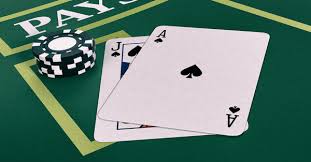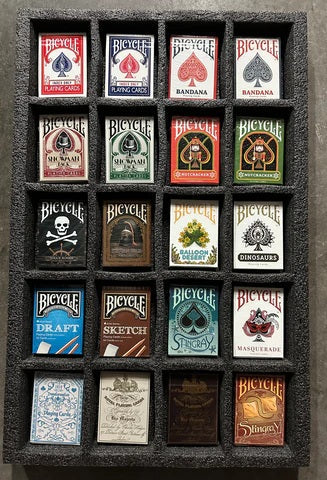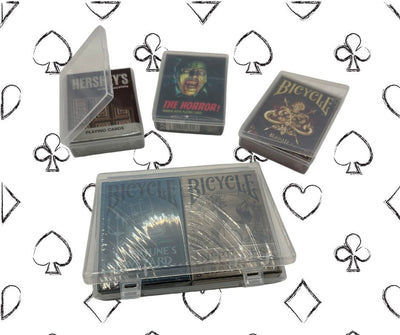
(An Ace and a King make a natural in the game of Blackjack)
Card Game Rules
Blackjack or Twenty-One is a casino type game where players bet against the dealer for hands as close to 21 as possible without going over.
For other casino type games, see our guides for Texas Hold'em Poker and Seven Card Stud Poker.
Rank of Cards
Cards from 2-10 are worth their face value. Face cards are worth 10. Aces are worth 11 or 1 depending on which is more advantageous to the hand.
Deal
At the beginning of the game, the dealer shuffles the pack of cards (normally more than one) and selects a random player to cut the deck. After the deck is cut, a plastic insert is placed randomly in the deck to designate a reshuffle. This limits the ability of card counters and makes the game more difficult to beat the dealer.
Players then make their bets on the round. The dealer passes out one card face up to everyone including themselves. Next the dealer passes out one card face up to all of the players and one card face down for their own hand.
Possible Outcomes
Winning
If your hand is closer to 21 than the dealer’s, you win an equal amount to your bet. If your hand is equal to 21, it is called a “blackjack” or a “natural” and you automatically win 3:2 as long as the dealer does not also have a blackjack; If both you and the dealer have a blackjack, you push and no exchange of bets is made.
Losing
If the dealer’s hand is closer to 21 than yours, you lose your entire bet. If your hand becomes over 21 after a hit, it is called a “bust” and you automatically lose your bet, regardless if the dealer also busts.
Pushing
If your hand and the dealer’s hand are equal, you do not win or lose anything.
How to Play
Players always go first in a game of Blackjack before the dealer reveals their faced down card. Before a player begins official play, however, they may opt to do either or none of two things: buy insurance or surrender. A player may buy insurance in case that the dealer has a blackjack. Insurance is equal to the bet initially made and is given back to the player if the dealer does in fact have a blackjack. Insurance should only be bought in the case that the dealer’s face up card is a 10, face card, or Ace. Additionally, a player may surrender their hand if they are confident that they will lose. Surrendering gives the player back half of their bet while the other half is given to the dealer.
Starting with the one to the dealer’s left, players try to get their hand closer or equal to 21 than the dealer’s, without going bust. This can be done by hitting, standing, splitting, and doubling down.
Hitting
A player can choose to “hit” and request an additional card from the deck. Hitting can be signaled by saying “hit” or tapping the table.
Standing
A player can choose to “stand” and keep the original cards dealt. Standing can be signaled by waving their flat hand across their cards.
Splitting
A player can decide to “split” their cards only if the cards originally dealt to them are pairs. Splitting turns the pair into two individual hands, each with their own bet equal to the player’s first bet. The dealer then deals them two additional cards to complete each hand and the player again has the options to hit, stand, split, or double down.
Doubling Down
If a player is confident in their hand, they can decide to “double down” by doubling their initial bet. After the initial bet is made, the dealer gives them one more card after which the player must stand.
A list of places where you can play Blackjack online may be found here.
Basic Strategy
While the casino almost always has the advantage, players can adapt to a mathematically proven strategy, known as Basic Strategy, to increase their chances. Here are a few general rules to Basic Strategy:
- Never take insurance. For the most part it is not worthwhile. If the dealer does have a blackjack, you are better off taking the lost.
- Always double down if your initial cards are 9-11. In this scenario, an additional card will only help you get closer to 21 without busting.
- Always stand if your hand is 12-17+ and the dealer’s upcard is 2-6. In this scenario, the dealer will hit and either, hopefully, get a lower value than yours or go bust.
- Always hit if the dealer’s upcard is 7-A and your hand is either a 12-14 or an Ace/2-6. If the dealer has a 7-A, they are at the most advantageous and it is better to try your luck with an additional card.
- Always split if you have a pair of 2’s, 3’s, 6’s, 7’s, 8’s, or 9’s, and the dealer’s upcard is 2-6.
- Always split if you have 2 Aces.
Below is attached a Basic Strategy graph for a game of blackjack using 6 decks. You may also view the graph as well as other resources for playing blackjack here.
(Basic Strategy for a 6 deck game of Blackjack)
While Basic Strategy can improve one’s chances, it should be noted that even if someone follows Basic Strategy perfectly, they are not guaranteed a win.
Rule Variations
While the standard game of Blackjack is one of the most popular casino games in the world, every casino has their own variations on key rules. This guide will discuss common ones but, a more comprehensive list may be found on pagat's article on Blackjack, found here
Dealer Hits on 17
For most casinos, dealers are supposed to automatically stand if their first two cards equal to 17. Some casinos, however, allow their dealers to hit on 17. On the table, it will say either H17, for hit on 17, or S17, for stand on 17.
Number of Decks
Casinos choose how many decks will be used in a game of Blackjack. The more decks used, the larger of an advantage the dealer has over the players. This is due to the increased difficulty for a player to count cards. Because casinos want their games to appear more favorable to the player, they might use fewer decks but, compensate the favorability by having stricter rules like requesting higher minimum bets.
Blackjack Payout
While most casinos stick to the standard 3:2 payout for blackjacks, some opt for 6:5 payouts. This is a significant disadvantage for the player and it is advised to not play 6:5 blackjack.
Looking for more card games to play? Check out this article:
40+ Great Card Games For All Occasions
Recommended product for casino type games.
If you want to know more about the world of gambling and casinos, check out this book by Hugh Miller here.
Interview with Inside the Casino
John Nielsen from Inside the Casino interviewed us during the summer of 2018. They know all about casino games and equipment and we were happy to talk with them about the playing card industry. You may view the interview here
About the author: John Taylor is a content writer and freelancer through the company Upwork.com. You may view his freelancing profile here. He has a B. A. in English, with a specialty in technical writing, from Texas A&M University and a M. A. in English from the University of Glasgow. You may view his previous articles about card games here and his LinkedIn profile here.







2 comments
I used to play Blackjack back in the day when I was a kid one on one & I even liked it more better than playing Crazy 8’s. That’s how easy playing the game is especially when you’re playing against somebody.
fair game always never cheat me!!!!